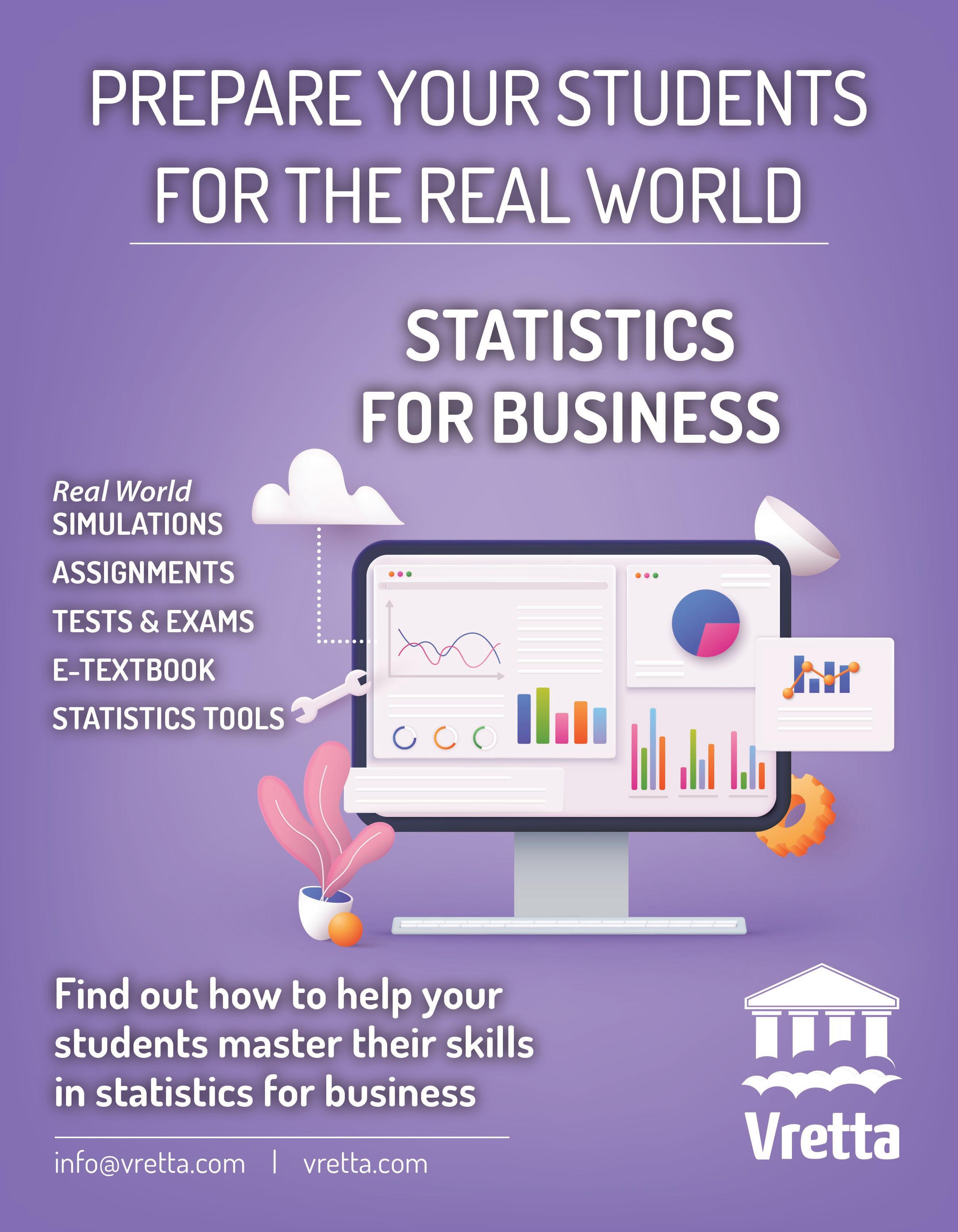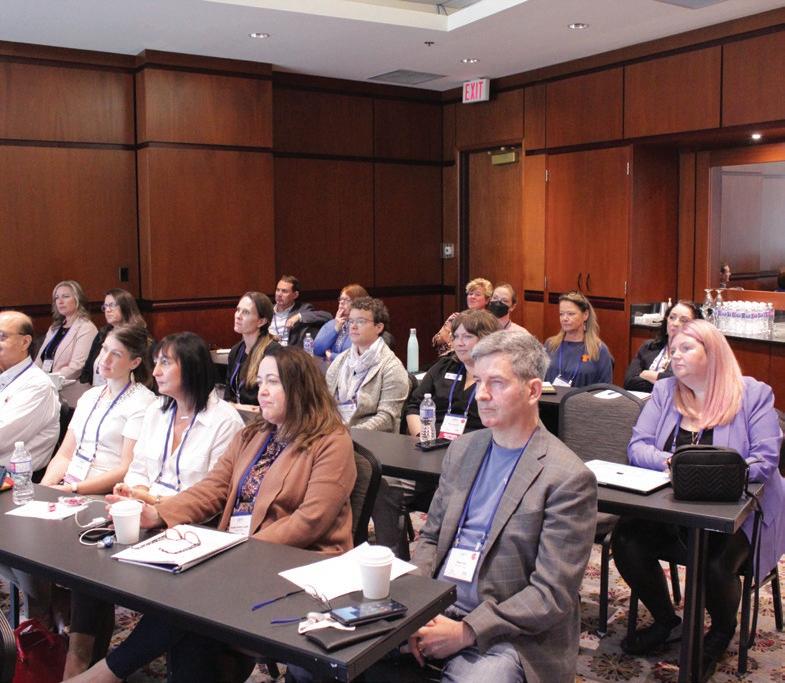







We ensure the safety and security of everyone on your premises.





Welcome to the Fall & Winter 2022/23 issue of College Administrator magazine. In this issue, we share some highlights from the Leaders and Innovators 2022 OCASA conference in Niagara Falls – our first in-person conference in three years!
We also put a spotlight on the impact and legacy of Linda Franklin, who is retiring from Colleges Ontario at the end of March after 15 years of service. OCASA bids a fond farewell as well to Bill Swan, who has been providing invaluable input for College Administrator magazine for 26 years.
The main theme of this issue of College Administrator is Stronger Through Support as we look at what health and wellness on college campuses looks like today. We also examine some of the tools available for students and staff that can help to support well-being, including Loyalist College’s new digital environment. And find out how you can connect with your peers through OCASA membership.
Food for Thought looks at the sensitive topic of food insecurity and the use of foodbanks on post-secondary campuses in Canada,
and how important this issue has become. It also examines some alternatives to basic emergency food bank services, including College La Cité’s Zero Stress Fund.
As always, we would love to connect with you. Please reach out any time with story ideas, exciting program news, and celebrations from your colleges. As a member of our association, you are an important part of this great community.
Remember that you can always connect with us on LinkedIn at www.linkedin.com/company/ontario-college-administrative-staffassociation-ocasa-/.

On behalf of the OCASA Board of Directors, I wish you all a wonderful start to 2023. We appreciate your work and dedication to a lifetime of learning for all.
Sara Budd, M.Ed OCASA President & Director, Academic Partnerships and Pathways – Georgian CollegeBienvenue dans le numéro d’automne/hiver 2022-2023 de College Administrator. Dans ce numéro, nous vous présentons quelques points saillants de la conférence Leaders and Innovators 2022 de l’APACO à Niagara Falls : notre première conférence en personne en trois ans!
Nous avons également mis l’accent sur l’impact et l’héritage de Linda Franklin, qui prend sa retraite de Collèges Ontario à la fin du mois de mars, après 15 ans de service. L’APACO fait également ses adieux à Bill Swan, qui a apporté une contribution précieuse au magazine College Administrator pendant 26 ans.

Le thème principal de ce numéro de College Administrator est Plus forts grâce au soutien. Par l’entremise de ce thème, nous nous penchons sur la santé et le bien-être dans les collèges d’aujourd’hui. Nous examinons également certains des outils disponibles pour les étudiants et le personnel qui peuvent contribuer au bien-être, notamment le nouvel environnement numérique du Loyalist College. Vous y découvrirez comment vous pouvez entrer en contact avec vos pairs en devenant membre de l’APACO.
De quoi alimenter la discussion se penche sur le sujet sensible de l’insécurité alimentaire et du recours aux banques alimentaires sur les
campus postsecondaires au Canada, et sur l’ampleur que la situation a prise. Il examine également certaines alternatives aux services de base des banques alimentaires d’urgence, notamment le Fonds Zéro stress du Collège La Cité.
Comme toujours, nous adorerions communiquer avec vous. N’hésitez pas à communiquer avec nous pour nous faire part d’idées d’articles, de nouvelles sur des programmes passionnants et de célébrations au sein de vos collèges. En tant que membre de notre association, vous êtes un élément important de notre grande communauté.

N’oubliez pas que vous pouvez toujours vous connecter avec nous sur LinkedIn à l’adresse suivante : www.linkedin.com/company/ontariocollege-administrative-staff-association-ocasa-/
Au nom du conseil d’administration de l’APACO, je vous souhaite à tous un merveilleux début d’année 2023. Nous apprécions votre travail et votre dévouement à une vie d’apprentissage pour tous.
Sara Budd, M.Éd. Présidente de l’OCASA et directrice des partenariats et des parcours universitaires – Collège Georgian
« Par l’entremise de ce thème, nous nous penchons sur la santé et le bien-être dans les collèges d’aujourd’hui. »
Niagara Falls | September 27 and 28, 2022
Approximately 70 people attended OCASA’s 2022 Leaders and Innovators Conference at the Niagara Falls Marriott Fallsview Hotel in September. The Leaders and Innovators Conference was a two-day event that provided highly relevant information, new practices, and meaningful networking uniquely designed for the college administrator. It was OCASA’s first in-person conference in three years, and the feedback from attendees and participants has been overwhelmingly positive.
The following comments were shared through the conference survey:
• "Current, relevant information in the PSE environment; Networking is what I enjoyed most!"
• "Good topic selection and dynamic speakers"

• "Panels provide opportunity to hear and learn from others. Shared experiences help make sense of our own. And cocreating strategies is a helpful take-away in operationalizing our post-Covid world."

“I really appreciated the sense of rejuvenation at OCASA this year. We have not been able to connect, face to face, in a long time and it felt great to just get together and share our experiences like we used to. As a Board member I especially enjoyed this year’s event because we had a high percentage of attendees that were new to administrative roles and OCASA. It is so critically important that we mentor new leaders within our sector and help them develop the skills to do great things.”
–Tony Mallette, Associate Dean, School of Health Sciences, Fanshawe College
“The OCASA 2022 Leaders & Innovators Conference was an engaging, interactive two-day event that provided important information, new practices, and networking opportunities that allowed me to connect with colleagues from across the sector. The keynote speakers delivered topics that provoked discussion and were highly engaging. The concurrent sessions allowed me to select topics that I wanted to have a great understanding about. For me, there were many highlights at the 2022 conference; the one that truly stands out was the workshop called Cultural Appreciation vs. Cultural Appropriation. Marc Forgette was the facilitator; if ever the opportunity presents itself to attend one of Marc’s workshops, YOU MUST GO!
The entire conference was thoughtfully planned and executed –from the location, meals, speakers, and valuable networking – it was obvious that a lot of time was placed in ensuring the attendees felt the time away from the office was well utilized. I highly recommend that college administrators carve out time to attend this conference.”
–Sara Tuck, B.B.A., CMP – Manager, Continuing Education and Corporate Training, Georgian College
“I attended my first OCASA Conference this year (September 2022). I appreciated learning about the experiences of leaders from across Ontario on topics related to trends in higher education, employee engagement, and leading teams in a post-pandemic world.


The Leaders and Innovators Conference was a two-day event that provided highly relevant information, new practices, and meaningful networking uniquely designed for the college administrator.


Some of the hot topics that emerged at this year’s OCASA conference were

• The Evolution of Microcredentials (Dr. Robert Luke, CEO, eCampus Ontario)

• The Outlook for Canada’s PSE System (Denise Amyot, CEO Colleges and Institutes Canada)
• New Three-Year Degrees (Dr. James Brown, CEO, Postsecondary Education Quality Assessment Board)
The Spring 2023 issue of College Administrator magazine will put the spotlight on these topics, so stay tuned!
It was wonderful to have the opportunity to engage in conversations, and share stories about our own successes and challenges leading teams in a hybrid environment, and how to best plan for the future of work in the college system. The hands-on workshop I attended focused on cultural appropriation vs appreciation which continues to build upon the cultural competencies we need to work with our diverse student populations. Overall, the conference was an excellent way to connect and share as we build on our learning as a community of leaders.”
–Fiorella M. Sabadin, MSc, Registrar, Fanshawe College
Dr. Karyn Gordon was this year’s fantastic morning keynote speaker who really got the group thinking about emotional intelligence and relationships.
Marc Forgette taught attendees how to create an Indigenous medicine bag – thank you for sharing your knowledge in this wellreceived workshop.

Amorell Saunders N'Daw shared a presentation on creating a plan for career growth.
Kevin J. Baker shared research on innovation in the Ontario college system that included a thoughtful discussion.
Thank you to Denise Amyot, CEO of Colleges and Institutes Canada, who was the afternoon keynote speaker and presented on the outlook for Canada’s post-secondary system.
Linda Franklin has served as President and CEO of Colleges Ontario – the advocacy voice for the province’s 24 colleges –for over 15 years, and is set to retire on March 31, 2023.



Franklin holds a B.A. and M.A. in English, History, and Journalism from the University of Western Ontario. She joined Colleges Ontario as President and CEO in January 2007.
During her tenure, she spearheaded advocacy campaigns that gained national attention to raise awareness of the skills shortage affecting Ontario’s economy. She also played a chief role in the creation of the first provincewide marketing campaign to promote the range of rewarding careers available to college graduates and growing public awareness of the value of attending college.
Recently, Franklin helped to secure Ontario government approval for standalone nursing programs and to allow colleges to develop three-year degree programs to run alongside the three-year diploma programs. Says Franklin, “We have made a real difference for students and the future of Ontario’s economy.”
Before her time at Colleges Ontario, Franklin was the President of the Wine Council of Ontario, a position she held and enjoyed for 13 years. While she admits that at the time she didn’t really know a lot about colleges, she quickly realized her wine branding and marketing experience could be used to help grow awareness of the importance and value of Ontario colleges. She saw what she believed was a branding problem for the college system. Franklin’s passion for that work continued during her many years at Colleges Ontario and motivated her to foster successful changes.
Just two weeks into her new role at Colleges Ontario she found herself travelling to Centennial College for a work conference. “Those first few weeks were a bit of a blur,” she recalls. She was impressed by the welcome she received at the conference, the learning opportunities, and the networking. “What an amazing experience!” Franklin says. She immediately felt she had landed in a great place, one that she could see herself staying at for a long, long while.
Linda’s passion about this role and the work it involves has been of great value to groups like OCASA. “OCASA has been so fortunate to have had strong support and leadership from Linda Franklin. Over the last many years she has provided invaluable guidance to OCASA, she has supported our work on behalf of our members, and her keynotes have consistently been a highlight of our annual conference,” says Erin Roberts, OCASA Executive Director.
“On behalf of the OCASA team and board, I want to thank Linda and recognize her for her outstanding contribution to the college system and Colleges Ontario’s partnership with OCASA. We wish her a long and happy retirement, and we will miss her,” adds Roberts.
What has been the best part of this role for Franklin? She says: “So many things. The opportunity to make a difference is number one.” She also notes the people she has worked with, the sense of collegiality, high-functioning boards on campuses – people working together who are motivated to help students, their communities, and local businesses. “There’s a real sense of the power and value proposition of going to college today; that to me has been really rewarding.”
Franklin feels that 2023 is the right time for her to retire and she knows she is leaving the association in good shape. “In the last few years we’ve gotten some pretty fundamental important government policy requests off our plates. It feels like a good moment to hand it off,” she explains. With a refresh in leadership, she says, Colleges Ontario can tackle questions like: What do the next several years look like now? What are the big issues to focus on now?
“This was just a glorious place to end my career. The system has such a lot to offer and it’s so important.”
When asked about what she wants to leave as her legacy, Franklin replies: “All you can really hope for is that you leave the system strong and better; and I think I have. But it’s not just me – I have a wonderful team at Colleges Ontario and a really amazing board to work with.” She feels that the group is a collaborative, cohesive
team that has found a way to a single voice with a good working relationship with government, focusing on a handful of priorities. “I think we’ve had good success with government, maybe more than we might have imagined.”
What Franklin hopes people will take from the history of her career: “Always be brave about new opportunities because sometimes there’s something wonderful around the corner waiting for you.”
College Administrator is seeking articles of interest to administrators in Ontario colleges for our Spring 2023 issue .


College Administrator is the bi-annual digital publication of OCASA (Ontario College Administrators Network). The magazine aims to engage and connect with hundreds of administrators at Ontario’s 24 colleges, along with college presidents and all members of boards of governors.

We’re looking for timely and topical articles and columns to inspire lively and meaningful discussion on topics important to the Ontario college community. Feature stories run about 1,500 to 2,500 words, with columns at approximately 750 words.
Our editorial deadline for the Spring 2023 issue is March 3, 2023
Please reach out any time to College Administrator Managing Editor Monique Doyle at monique@kelman.ca or 204-985-9712 with questions, story ideas, and submissions.
“Linda’s passion about this role and the work it involves has been of great value to groups like OCASA.”


omewhere, on the grounds of Durham College in Oshawa, a two-metre-long slide rule lies buried.
In concrete.
(A slide rule was a mechanical calculator based on logarithms, developed by Scottish mathematician John Napier in the 17th century. It required no batteries, no recharging, and a lot of training to be useful.)
Learning to use a slide rule became a rite of passage for first year tech and engineering students. Thus, the six-foot version for classroom demonstration.
In the late ‘60s and early ‘70s, along came the pocket calculator. For a couple of hundred bucks (in 1970s dollars, a week’s pay for a faculty member) you could buy this hand-held device, and it even gave accurate answers instead of fairly good approximations.
The slide rule was dead.
At Durham College, the giant version was buried in a mock funeral ceremony.
But not quite.
The next year, a raiding party from Mohawk College exhumed Napier in the dark of night and carried it off to Hamilton for reburial.
Again, not quite.

A counter-raiding party from Durham found Napier, and (in the dark of night) carried it back to Oshawa, where it was once again buried –this time encased in concrete. RIP, Napier.
I cite this story as one sample of a rich history in danger of being lost.
It is one tale touching two colleges: every college undoubtedly has a treasure of history that is vaguely documented and in danger of being lost in the memory of seniors like me.
The story of Napier was chronicled in the Durham College Chronicle (full disclosure: I was the founding supervising editor).
Another tale from those long-ago days is that of the microchip. A front-page photo of Durham’s then-Technology Chair Jack Davidson holding an electronic circuit the size of a thumbnail, boasting that this little chip would change the world in which we live.
We sure chuckled over that. Sure, Jack, dream on. Little did we know.
Sadly, to my knowledge that particular edition of The Chronicle did not survive. Back then, libraries and administrators and faculty could
not fully appreciate the value of the history they were creating.
My Spidey sense suggests that similar lost history is replicated across all colleges.
The colleges have become an important cog in the economic engine of Ontario. It didn’t start out that way. Those present at the beginning had no idea. As faculty, many of us plugged along, pushing for space, equipment, and methods that in retrospect we should have been fired for not doing.

I started out in education some 63 years ago. This included a stint in a two-room rural school, complete with a wood-burning stove and a woodshed. Returning from recess, kids fetched blocks of wood.
At Durham, as a union steward in the ‘80s, I was twice out on strike (1984 and 1989). From this latter, a cautionary note: I walked the picket line advocating for a workload formula. One year later I became a division chair and found myself responsible for applying the damned thing. The first iterations of those calculations were done by hand. Be careful what you ask for.
I write this column as final farewell: Earlier this year I stepped down as a member of the editorial board of College Administrator, confident that the magazine that I helped pioneer in retirement is in good hands with OCASA executive and the editorial board, and production and editorial services at Craig Kelman & Associates.
From my many long years in education and journalism there are a number of things I would have done differently.
As a faculty member, I would have become more active earlier; if rank and file faculty do not step forward, the minority of radicals will, and everyone ends up where no one wants to be.
I wish that OCASA had existed much earlier. The networking, the conference, the webinars – all would have changed the direction of my limited academic career. (A final plug: If you are not an OCASA member, become one; if you are not active in OCASA, get moving.)


Finally, I dip my hand into the fantasy bowl and pull out radical wishes: that OCASA include presidents in the membership eligibility; and a special class of membership be created for faculty, perhaps in an informal linkage, to brainstorm the future.
Colleges came into their own when graduates became professors, professors became directors, and directors and vice presidents became college presidents. Only then did colleges fully understand themselves.
They’ve growed up real good.

Bill Swan was a contributing editor for College Administrator magazine for 26 years. We owe him a huge thank you for all his work and wish him all the best!
During the height of the COVID-19 pandemic, health and wellness for students and staff was focused on staying home and isolating when ill, social distancing and wearing masks, enhanced hand washing and sanitizing, and access to COVID-19 vaccines. Now that college campuses are experiencing a large return to routine, “normal,” and oncampus life in 2022–2023, what does health and wellness look like?
What changes are we seeing after a few years of dealing with the COVID-19 pandemic? For the most part, colleges are now mask-friendly spaces but wearing a mask on campus is not mandatory. And currently there is a call to end sick note requirements for employees in Ontario. Proposed labour legislation banning employers in Ontario from requiring sick notes when employees take time off from work will help contain illnesses and free up valuable appointment time with doctors, say some doctors. Also, sick notes create an unnecessary expense for patients as most doctors bill the patient directly for this service. In the meantime, some colleges will continue to require a sick note from employees after three days of missed work.
Health and safety continue to be a priority at colleges across the province. At Sheridan College, rapid antigen testing is no longer required for those who are not vaccinated, but they do provide rapid antigen testing on campus to those who request it. They have also announced that, given the increased demands on the public health system, the need for students to provide medical (sick) notes has been suspended.
Employee wellness and assistance programs for college staff have seen some changes as well, including boosting access to the support options available for staff. Often offering proactive health support, these programs have had to increase access through digital channels such as chat, video calls, and self-serve wellness tools.
For example, Algonquin College’s partnership with LifeWorks (which is similar to many other Ontario colleges) provides professional, confidential counselling, support, and information services for employees and their immediate family members. Their services include:

• Counselling via telephone, in person, or email sessions


• Health and fitness coaching
• Support for traumatic events
• Access to wellness resources including action plans, and self-directed help kits on real issues that focus on Health and Well-being, Career and Workplace, Financial Security, and Life Events
• Specialized workshops and seminars that focus on a range of work, family, and life issues
The Ontario College Administrators Network (OCASA) is a voluntary, professional association that supports Ontario’s college administrators, while supporting and promoting administrative excellence.
OCASA membership gives you:
Strength in Numbers – A professional network of over 400 college leaders across Ontario.
Leadership Opportunities – Make a difference by joining the OCASA board and committees. Nominate yourself or a colleague for the prestigious OCASA Awards.
Representation – We represent administrators to the College Employer Council for pension and benefits.
Legal Support – Get valuable free employment-related advice when you need it most.

• Job Evaluation Services – Get a preferred member rate on job evaluation services.
• Professional Growth Opportunities
o Administrator Summits and a members-first annual conference
o Tuition discounts with Central Michigan University (CMU) and Niagara University in Ontario (NUO)
o Student bursary awards
Visit www.ocasa.on.ca/membership to join. New members, join today and enjoy your first year free.
Dear Colleague,
As an Ontario college administrator, one of my critical professional resources is membership in OCASA.

OCASA members provide exceptional leadership in their colleges, and are committed to sharing, supporting and encouraging best practices across the system.
There is no other organization dedicated exclusively to the professional interests of Ontario’s college administrators.
I invite you to join now.
Sara Budd , M.Ed President, OCASA Director, Academic Partnerships and Pathways, Georgian CollegeThese types of programs for staff are a good place to turn to for support; they offer a wide range of employee wellness tools and assistance that are more accessible than ever through digital access, multi-language options, etc.
Mental Health Support Support for mental health is more important than ever today. In February 2021, the Ontario government announced it was providing $7 million to help increase access to mental health and addiction services for post-secondary students during COVID-19. The funding aims to provide more supports for students, both on-campus and virtually, and can also be used to address the needs of vulnerable and diverse groups, such as Indigenous students, LGBTQ students, and students with disabilities.
"We know that college and university can be a difficult time for our students, and that the COVID-19 outbreak has only increased those pressures on their mental health," said Ross Romano, former Minister of Colleges and Universities. "That is why it is so important that we recognize the need for added support by investing more in mental health services. This added funding will give our colleges and universities the ability to expand services and better meet student needs – creating the best conditions possible for students to achieve their goals."
This is part of the Ministry of Health's more than $147 million in funding for mental health supports and builds upon the province's $19.25 million investment for publicly-assisted colleges and universities.
The additional funding will help to immediately expand access for post-secondary students to the provincial mental health and addictions system in response to COVID-19, and help to build a connected and comprehensive mental health and addiction system for children, youth, and adults in Ontario.
According to an Ontario Student Drug Use and Health Survey Report released in April 2022 by the Centre for Addiction and Mental Health (CAMH), the COVID-19 pandemic has had a major impact on the mental health of Ontario students. Of students surveyed, 59% said the pandemic has made them feel depressed about the future, and 39% reported it has made their mental health worse. About 18% reported that they seriously contemplated suicide in the past year.
Because the majority of Canadian post-secondary students are still dealing with the effects of the COVID-19 pandemic on their mental health, a new report is calling on the federal government to enact policies to address the mental well-being of students.
Published by the Canadian Alliance of Student Associations, the report, titled “The New Abnormal: Student Mental Health Two Years Into COVID-19,” found that three quarters of students reported experiencing negative mental health during their studies during the 2021–2022 school year.
Many Ontario colleges currently offer wellness apps and other digital tools, emergency food banks, and support services/counselling for students struggling with addictions. Addressing mental health on campuses going forward will probably require years of effort and the creation of new and expanded support systems.
Today, as students are largely back in person on campuses, the higher education community is responding to this need. Many avenues of support for students can be accessed online (including the ability to book a private appointment for food bank assistance) which helps to ensure that support is accessible for everyone, and it can help to reduce some of the discomfort and anxiety for those who find that they need help.

Fortunately, post-secondary institutions are finding that the tools they developed during COVID-19, and the expansion of existing support systems, can help to create a more positive, flexible learning environment. These tools also include support specifically for international students.
For international students at Fanshawe, Fanshawe Cares is a 10-day series of sessions. These sessions help international students prepare for their time at Fanshawe, and include information on housing, Library Learning Commons, health insurance, Fanshawe Student Union, Career Services, the Wellness Centre, and more.
iCent is a free app for Algonquin College’s international students to access resources and services, online portals, and to receive important notifications from the International Education Centre. The app has multiple tools that are designed to help students acclimatize to their new environment within their smartphone.
Hopefully, being back in person on campus regularly and back to a more normal school routine will help to bring a positive change for college students and staff. A reason to connect with others and participation in groups (including OCASA) can be beneficial.
CMHA research shows that we feel better when we feel supported. Social connection can lower anxiety and depression, help people regulate their emotions, lead to higher self-esteem and empathy, and help to boost our immune systems.
Positive well-being for students and staff might involve making new connections through participation in campus clubs or groups and attending events with peers, either in person or virtually.
In October 2022, Loyalist College launched a first-of-its-kind digital campus experience, in partnership with Arcadis AIBI Group. “The pandemic accelerated an already shifting post-secondary landscape to prioritize new digital modes of engagement for students.
Destination Loyalist is a ‘campus in your pocket’ – a unique virtual resource that connect students, employees, community, and industry with information, support and future-focused solutions,” said Mark Kirkpatrick, Acting President of Loyalist College, in a recent press release.
Braden Root-McCaig, Director of Marketing and Communications at Loyalist College, explained the push for this platform: “When new students are deciding whether to attend Loyalist College, the best way of showing them this ‘power of small’ is to bring them on campus and have them experience it first-hand. When the pandemic arrived and campus visits were restricted, we needed a new way share this experience. At its simplest, the question was ‘how can students experience a campus they can’t visit,’ but quickly this expanded to a broader focus on optimizing student experience through new interactive online technologies.”
Destination Loyalist’s digital environment will host content on programming and campus news, mirroring the flow of activity for the college’s services and events. The space includes five navigation modes: Welcome, Community, Innovation, Campus Life, and Events. The Events node will provide a virtual gathering place for hosting live events.
“There have been many lessons from recent years but most of all we’ve learned that you can’t stay still,” says Root-McCaig. “Students and staff deserve a team that is always trying to anticipate their needs and improve the quality of their experience. Online events are here to stay but we feel that audiences are asking for more from these events: more interactivity, more immersion, and more fun.”
What types of events are possible? “The ability to host live events in the space is our newest feature and we’re excited about the flexibility this provides to making the space more interactive. Whether it’s organizing a digital campus tour from anywhere in the world, or hosting a motivational speaker with remote participation, the opportunity to host events is a further way to bring the space to life,” Root-McCaig explains. “For our team, the Destination Loyalist project was a reminder of what is truly at the heart of our communications work: building relationships by creating fun, informative, engaging experiences.”
For colleges like Loyalist, it’s important to focus on responding to current needs, improving the quality of the campus experience, and helping all students in their daily lives to improve their chances of success and well-being.
References:
• https://news.ontario.ca/en/release/60275/ontario-increasesmental-health-funding-for-postsecondary-students
• www.camh.ca/en/camh-news-and-stories/majority-of-ontariostudents-surveyed-report-feeling-depressed--about-the-futurebecause-of-covid-19


• Économisez jusqu’à
• Notre équipe d’experts en sinistres est prête à vous aider

Prendre soin du corps étudiant
Au plus fort de la pandémie de COVID-19, la santé et le bien-être des étudiants et du personnel étaient axés sur le maintien à domicile et l’isolement en cas de maladie, la distanciation sociale et le port de masques, le lavage et la désinfection des mains et l’accès aux vaccins contre la COVID-19. Maintenant que les collèges connaissent un grand retour à la routine, à la « normale » et à la vie sur le campus en 2022-2023, à quoi la santé et le bien-être ressemblent-ils?
Quels changements constatons-nous après quelques années de gestion de la pandémie de COVID-19? Dans la plupart des cas, les collèges sont des espaces adaptés aux masques, où le port du masque n’est cependant pas obligatoire. Un appel est actuellement lancé pour mettre fin à l’obligation de prendre un congé de maladie pour les employés en Ontario. Selon certains médecins, la législation du travail proposée, qui interdit aux employeurs de l’Ontario d’exiger des notes du médecin lorsque les employés s’absentent du travail, permettra de contenir les maladies et de libérer du temps précieux pour les vrais rendez-vous avec les médecins. De plus, les notes du médecin entraînent une dépense inutile pour les patients, car la plupart des médecins facturent ce service directement au patient. Entre-temps, certains collèges continueront d’exiger une note du médecin de la part des employés après trois jours d’absence.
La santé et la sécurité demeurent une priorité dans les collèges de la province. Au Sheridan College, le test d’antigène rapide n’est plus requis pour les personnes non vaccinées, mais il est proposé sur le campus à ceux et celles qui le demandent. Le collège a également annoncé que, compte tenu des exigences accrues du système de santé publique, l’obligation pour les étudiants de fournir des notes du médecin a été suspendue.
Les programmes d’assistance et de bien-être des employés destinés au personnel des collèges ont également connu quelques changements, notamment l’amélioration de l’accès aux options de soutien disponibles pour le personnel. Offrant souvent un soutien proactif en matière de santé, ces programmes ont dû accroître l’accès par des canaux numériques tels que le chat, les appels vidéo et les outils de bien-être en libre-service.
Par exemple, le partenariat du Collège Algonquin avec LifeWorks (semblable à celui de nombreux autres collèges de l’Ontario) offre des services professionnels et confidentiels de conseil, de soutien et d’information aux employés et aux membres de leur famille immédiate. Les services offerts comprennent notamment :

• Counselling par téléphone, en personne ou par courriel
• Mentorat en matière de santé et de mise en forme

• Soutien en cas d’événements traumatiques
• Accès à des ressources de bien-être, y compris des plans d’action et des trousses d’aide autogérés pour les questions réelles axées sur la santé et le bien-être, la carrière et le lieu de travail, la sécurité financière et les événements de la vie
• Ateliers et séminaires spécialisés portant sur une série de questions relatives au travail, à la famille et à la vie personnelle Ces types de programmes destinés au personnel sont une bonne source de soutien; ils offrent un large éventail d’outils et d’aide au bien-être des employés, et ils sont plus accessibles que jamais grâce à l’accès numérique, aux options multilingues, et plus encore.
Le soutien à la santé mentale est plus important que jamais aujourd’hui. En février 2021, le gouvernement de l’Ontario a annoncé qu’il versait 7 millions de dollars pour aider à améliorer l’accès aux services de santé mentale et de toxicomanie pour les étudiants de niveau postsecondaire pendant la pandémie de COVID-19. Ce financement vise à fournir davantage de soutien aux étudiants, tant sur le campus que virtuellement, et peut également être utilisé pour répondre aux besoins de groupes vulnérables et diversifiés, tels que les étudiants autochtones, les étudiants LGBTQ et les étudiants en situation de handicap.
« Nous savons que le collège et l’université peuvent être une période difficile pour nos étudiants et que l’épidémie de COVID-19 n’a fait qu’accroître ces pressions sur leur santé mentale, a déclaré Ross Romano, ancien ministre des Collèges et Universités. C’est pourquoi il est si important que nous reconnaissions le besoin d’un soutien supplémentaire en investissant davantage dans les services de santé mentale. Ce financement supplémentaire donnera à nos collèges et universités la possibilité d’étendre les services et de mieux répondre aux besoins des étudiants, en créant les meilleures conditions possibles pour que les étudiants atteignent leurs objectifs. »
Cette somme s’inscrit dans le cadre du financement du ministère de la Santé de plus de 147 millions de dollars pour les services de soutien en santé mentale et s’ajoute à l’investissement de 19,25 millions de dollars de la province pour les collèges et universités subventionnés par l’État.
Le financement supplémentaire permettra d’élargir immédiatement l’accès des étudiants du postsecondaire au système provincial de santé mentale et de lutte contre les dépendances en réponse à la COVID-19. Il aidera aussi à mettre en place un système de santé mentale et de lutte contre les dépendances connecté et complet pour les enfants, les jeunes et les adultes en Ontario.
Selon le rapport du Sondage sur la consommation de drogues et la santé des étudiants de l’Ontario publié en avril 2022 par le Centre de toxicomanie et de santé mentale (CTSM), la pandémie de COVID-19 a eu un impact majeur sur la santé mentale des étudiants ontariens. Parmi les étudiants interrogés, 59 % ont déclaré que la pandémie les a rendus dépressifs face à l’avenir. 39 % ont indiqué qu’elle a aggravé leur santé mentale. Environ 18 % ont déclaré avoir sérieusement envisagé le suicide dans les douze derniers mois.
Étant donné que la majorité des étudiants canadiens de niveau postsecondaire doivent encore faire face aux effets de la pandémie de COVID-19 sur leur santé mentale, un nouveau rapport demande au gouvernement fédéral d’adopter des politiques visant à améliorer le bien-être mental des étudiants.
Publié par l’Alliance canadienne des associations étudiantes, le rapport, intitulé « The New Abnormal: Student Mental Health Two
Years Into COVID-19 », révèle que trois quarts des étudiants ont déclaré avoir eu une santé mentale négative pendant leurs études au cours de l’année scolaire 2021-2022.
De nombreux collèges de l’Ontario offrent actuellement des applications de bien-être et d’autres outils numériques, des banques alimentaires d’urgence et des services de soutien et conseils pour les étudiants aux prises avec des dépendances. À l’avenir, la prise en charge de la santé mentale sur les campus exigera probablement des années d’efforts et la création de systèmes de soutien nouveaux et élargis.


Aujourd’hui, alors que les étudiants reviennent en grande partie en personne sur les campus, la communauté de l’enseignement supérieur répond à ce besoin. De nombreux moyens d’aide aux étudiants sont accessibles en ligne (y compris la possibilité de prendre un rendezvous privé pour obtenir de l’aide de la banque alimentaire), pour que l’aide soit accessible à tous et pour réduire la gêne et l’anxiété de ceux qui ont besoin d’aide.
Heureusement, les établissements d’enseignement supérieur constatent que les outils mis au point pendant la pandémie de COVID-19 et l’élargissement des systèmes de soutien existants peuvent créer un environnement d’apprentissage plus positif et plus souple. Ces outils comprennent également un soutien spécifique aux étudiants internationaux.
Pour les étudiants internationaux à Fanshawe, Fanshawe Cares est une série de sessions de 10 jours. Ces sessions aident les étudiants internationaux à se préparer à leur séjour à Fanshawe. Elles comprennent des renseignements sur le logement, les espaces communs de la bibliothèque, l’assurance maladie, le syndicat étudiant de Fanshawe, les services d’orientation professionnelle, le centre de bien-être, etc.
iCent est une application gratuite permettant aux étudiants internationaux du Collège Algonquin d’accéder aux ressources, services et portails en ligne, et de recevoir des notifications importantes du Centre d’éducation internationale. L’application dispose de plusieurs outils conçus pour aider les étudiants à s’acclimater à leur nouvel environnement à l’aide de leur téléphone intelligent.
Espérons que revenir régulièrement sur le campus et retrouver une routine scolaire plus normale contribueront à apporter un changement positif pour les étudiants et le personnel des collèges. Une raison de se rapprocher des autres et participer à des groupes (y compris l’APACO –www.ocasa.on.ca/membership) peut être bénéfique.
Les recherches de l’ACSM montrent que nous nous sentons mieux lorsque nous nous sentons soutenus. Les liens sociaux diminuent l’anxiété et la dépression, aident les gens à contrôler leurs émotions, augmentent leur estime de soi et leur empathie, et sont même bénéfiques pour le système immunitaire.
Le bien-être des étudiants et du personnel peut impliquer l’établissement de nouveaux liens en participant à des clubs ou à des groupes sur le campus et en assistant à des événements avec des pairs, que ce soit en personne ou en ligne.
En octobre 2022, le Loyalist College a lancé une expérience de campus numérique unique en son genre, en partenariat avec Arcadis AIBI Group. « La pandémie a accéléré un paysage postsecondaire déjà en pleine mutation pour donner la priorité aux nouveaux modes d’engagement numériques pour les étudiants. Destination Loyalist est un “campus dans votre poche”, une ressource virtuelle unique qui
relie les étudiants, le personnel, la communauté et l’industrie avec des renseignements, du soutien et des solutions orientées vers l’avenir », a déclaré Mark Kirkpatrick, président par intérim du Loyalist College dans un récent communiqué de presse.
Braden Root-McCaig, directeur du marketing et de la communication du Loyalist College, a justifié la mise en place de cette plateforme : « Lorsque les nouveaux étudiants décident de s’inscrire au Loyalist College, la meilleure façon de leur montrer le “pouvoir des petites choses” est de les amener sur le campus et de leur faire vivre une expérience directe. Lorsque la pandémie est arrivée et que les visites du campus ont été restreintes, il nous fallait une nouvelle façon de partager cette expérience. Au départ, la question était de savoir comment les étudiants pouvaient découvrir un campus qu’ils ne pouvaient pas visiter, mais elle s’est rapidement étendue à l’optimisation de l’expérience des étudiants grâce aux nouvelles technologies interactives en ligne. »
L’environnement numérique de Destination Loyalist accueillera du contenu sur la programmation et les nouvelles du campus, reflétant le flux d’activité des services et des événements du collège. L’espace comprend cinq modes de navigation : Accueil, Communauté, Innovation, Vie sur le campus et Événements. Le nœud « Événements » constituera un lieu de rassemblement virtuel pour l’organisation d’événements en direct.
leur expérience. Les événements en ligne sont là pour rester, mais nous avons le sentiment que le public en demande davantage : plus d’interactivité, plus d’immersion, plus de plaisir. »
Quels types d’événements sont possibles? « La possibilité d’organiser des événements en direct dans cet espace est notre toute dernière fonctionnalité. Nous sommes ravis de la flexibilité que cela offre pour rendre l’espace plus interactif. Qu’il s’agisse d’organiser une visite du campus numérique de n’importe où dans le monde ou d’accueillir un conférencier motivateur avec une participation à distance, la possibilité d’organiser des événements est un moyen supplémentaire de donner vie à cet espace, expliquet-il. Pour notre équipe, le projet Destination Loyalist a été un rappel de ce qui anime notre travail de communication : construire des relations en créant des expériences amusantes, informatives et engageantes. »
Pour les collèges comme Loyalist, il est important de s’attacher à répondre aux besoins actuels, à améliorer la qualité de l’expérience sur le campus et à aider tous les étudiants dans leur vie quotidienne afin d’améliorer leurs chances de réussir et de veiller à leur bien-être.
Références :
• https://news.ontario.ca/en/release/60275/ontario-increasesmental-health-funding-for-postsecondary-students
• www.camh.ca/en/camh-news-and-stories/majority-ofontario-students-surveyed-report-feeling-depressed--aboutthe-future-because-of-covid-19


«
"Les liens sociaux diminuent l’anxiété et la dépression, aident les gens à contrôler leurs émotions, augmentent leur estime de soi et leur empathie, et sont même bénéfiques pour le système immunitaire. »
Food insecurity on campuses reflects what’s happening in the general population. This problem is positioned as one of Canada’s major health issues and is associated with chronic health problems and poor mental health.
Household food insecurity – the inadequate or insecure access to food due to financial constraints – is a serious public health problem in Canada. Imagine being anxious about when you will be able to eat your next meal, how many meals you will have to skip to make ends meet, and how you will be able to afford to eat this week. And often mixed in is psychological stress and feelings of shame and embarrassment. It’s a deeply personal issue that not everyone affected is comfortable talking about.

It’s not surprising, then, that food insecurity is also linked to poor academic performance, lower grades, and higher drop-out rates.
Food insecurity isn’t a new problem – it was a problem before the COVID-19 pandemic hit. But the pandemic created additional challenges for those struggling to make ends meet, like some students. The pandemic resulted in lost student work and on-campus food services. Combined with the rising cost of living, high inflation rates, and more expensive groceries, many are finding their food budget is tight. Everybody is feeling the pinch.
Statistics Canada reported in September 2022 that food prices increased by 9.8% in August (10.8% for groceries and 7.4% in restaurants), compared with August of 2021. It’s the fastest increase for groceries since 1981, and attributed in large part to continuing supply chain challenges, extreme weather, and Russia’s invasion of Ukraine.
The first food banks on campuses are thought to have opened in the early 1990s, established by students who saw an urgent community need. Today, there are food banks on many college campuses that are managed by students, schools, and through partnerships. Aid is available through food banks, food pantries, and sometimes through other resources like low-cost meals, grocery cards, and care cupboards.
The number of people using food banks across Canada hit an all-time high in 2022, a report in October from Food Banks Canada indicates.
By Monique DoyleOn campus, rates of food insecurity are generally higher among international students as well as Black and Indigenous students, and students of colour.
The emergency food bank at Confederation College is a partnership between the student association (SUCCI) and the college; it also benefits from a partnership with the Regional Food Distribution Association. Because food bank use is a short-term fix – emergency relief – students with a greater need than can be met with limited food bank resources are encouraged to apply for other support options –like financial aid and off-campus community resources.
In 2020, Sault College closed its on-campus food bank for about a month because of the COVID-19 pandemic. The Student Union led food bank reopened in April 2020 with support from staff and the students’ union. Donations from the community, including United Way Sault Ste. Marie and Algoma District/Harvest Algoma, also help support this important resource. From April 20 to June 25, 2020, more than 600 students used the Sault College food bank, amounting to 1,216 visits to the much-needed resource centre. In the Fall 2022 semester (Sept.1 to Dec. 15) about 720 students used the food bank, amounting to more than 2,585 visits. Students are able to visit the food bank once a week.

Seneca’s food bank, with four campus locations, is run by the Seneca Student Federation. Students can only register for assistance once a month, but it can help more than 1,200 students on a first-come first-served basis.
Collège La Cité recently created an innovative alternative for students in need. The Zero Stress Fund was launched in March 2020 by the College's Philanthropy and Alumni office, in collaboration with the Student Association and the Office of Admissions and Registrar, to meet the demands of a student body living with financial challenges and to support students with pressing and immediate unmet physiological needs. This emergency fund complements the college's food bank and allows for the purchase of food for students and their families; it can also help pay for housing or any other expenses requiring urgent support, such as transportation, school supplies, clothing, or other personal effects.
An October 2021 report by Macleans magazine found that approximately 40% of post-secondary students in Canada are food insecure.
The Zero Stress Fund has been the flagship project of La Cité’s annual fundraising campaign for three years now. To date, close to 400 students have benefited from the fund; it has even prevented six students from being evicted from their homes, according to Christiane Matte, Director, Philanthropy and Alumni at Collège La Cité. Over $100,000 has been raised to date to help the college’s students in need. And Desjardins has doubled all donations to the fund up to $20,000 for the past three years.

Maslow's hierarchy of needs is a motivational theory in psychology with a five-tier model of human needs, often shown as hierarchical levels within a pyramid.

From the bottom of the pyramid upwards, the needs are: physiological (food, shelter, and clothing), safety (job security and health), love and belonging (friendship, a sense of connection), esteem (respect, self-esteem, strength), and self-actualization (desire to become the most that one can be). Needs lower down in the hierarchy must be satisfied before individuals can attend to needs higher up.
Maslow believed that people have an inborn desire to be selfactualized, that is, to be all they can be. To achieve this ultimate goal, however, a number of more basic needs must be met. Since these include food, safety, belonging, and self-esteem, food insecurity has the power to prevent people from moving on to their other needs, making it more difficult for them realize their potential and secure their future.
Now, more than ever, colleges are working through partnerships and with their communities to help those students in need. With a link between financial insecurity and mental health, and the resulting difficulty for some students to meet their basic needs – like having enough to eat, this type of support is becoming invaluable when it comes to the well-being and academic success of post-secondary students.
• www.macleans.ca/education/the-fight-to-end-hungeron-canadian-university-campuses
• www.theglobeandmail.com/canada/toronto/ article-food-insecurity-remains-an-obstacle-forinternational-students
• www.sootoday.com/local-news/hungry-college-studentslooking-for-food-financial-donations-2523735
• https://ssfinc.ca/food-bank
Selon un rapport publié en octobre 2021 par le magazine Macleans, environ 40 % des étudiants de niveau postsecondaire au Canada souffrent d’insécurité alimentaire.

L’insécurité alimentaire sur les campus est le reflet de ce qui se passe dans la population générale. Ce problème est considéré comme l’un des principaux problèmes de santé au Canada et est associé à des problèmes de santé chroniques et à une mauvaise santé mentale.
L’insécurité alimentaire des ménages, c’est-à-dire l’accès insuffisant ou incertain à la nourriture en raison de contraintes financières, est un grave problème de santé publique au Canada. Imaginez que vous ne savez pas quand vous pourrez manger votre prochain repas, ou que vous devez calculer combien de repas vous devrez sauter pour joindre les deux bouts. Imaginez que vous vous demandez comment vous pourrez vous permettre de manger cette semaine. À ces questions s’ajoutent souvent un stress psychologique et des sentiments de honte et d’embarras. Il s’agit d’un problème profondément personnel, de sorte que les personnes concernées le passent souvent sous silence.
Il n’est donc pas surprenant que l’insécurité alimentaire soit également liée à de mauvais résultats scolaires, à des notes plus basses et à un taux d’abandon plus élevé.

L’insécurité alimentaire n’est pas un problème nouveau. Il sévissait déjà avant la pandémie de COVID-19. Mais la pandémie a créé des défis supplémentaires pour ceux qui ont du mal à joindre les deux bouts, comme certains étudiants. La pandémie a entraîné la perte du travail des étudiants et des services alimentaires sur le campus. Si l’on y ajoute l’augmentation du coût de la vie, des taux d’inflation élevés et des produits d’épicerie plus chers, de nombreuses personnes trouvent que leur budget alimentaire est serré. Et tout le monde ressent ce pincement.
Statistique Canada a indiqué en septembre 2022 que les prix des aliments ont augmenté de 9,8 % en août (10,8 % pour l’épicerie et 7,4 % pour les restaurants) par rapport à août 2021. Il s’agit de l’augmentation la plus rapide pour les produits d’épicerie depuis 1981, attribuée en grande partie aux difficultés persistantes de la chaîne
d’approvisionnement, aux conditions météorologiques extrêmes et à l’invasion de l’Ukraine par la Russie.
On pense que les premières banques alimentaires sur les campus ont ouvert au début des années 1990, créées par des étudiants qui ont constaté un besoin urgent dans leur communauté. Aujourd’hui, il existe des banques alimentaires sur de nombreux campus universitaires qui sont gérées par les étudiants, les écoles et par l’entremise de partenariats. L’aide est offerte par l’entremise de banques alimentaires, de garde-manger et parfois d’autres ressources comme des repas à prix réduit, des cartes d’épicerie et des armoires de soins.
Le nombre de personnes qui ont eu recours aux banques alimentaires au Canada a atteint un sommet historique en 2022, selon un rapport publié en octobre par Banques alimentaires Canada. Sur les campus, les taux d’insécurité alimentaire sont généralement plus élevés chez les étudiants étrangers, noirs, autochtones et de couleur.
La banque alimentaire d’urgence du Confederation College est un partenariat entre l’association étudiante (SUCCI) et le collège; elle bénéficie également d’un partenariat avec l’Association régionale de distribution alimentaire. Le recours aux banques alimentaires étant une solution à court terme, une mesure d’urgence, les étudiants dont les besoins sont plus importants que ceux auxquels les ressources limitées des banques alimentaires peuvent répondre sont encouragés à demander d’autres options de soutien, comme l’aide financière et les ressources communautaires hors campus.
En 2020, le Collège du Sault a fermé sa banque alimentaire sur le campus pendant environ un mois en raison de la pandémie de COVID-19. La banque alimentaire dirigée par le syndicat étudiant a rouvert en avril 2020 avec le soutien du personnel et du syndicat étudiant. Les dons de la communauté, notamment de Centraide Sault Ste. Marie et Algoma District/Harvest Algoma, contribuent également à soutenir cette importante ressource. Du 20 avril au 25 juin 2020, plus de 600 étudiants ont eu recours à la banque alimentaire du Collège
du Sault, ce qui représente 1 216 visites dans ce centre de ressources indispensable. Au cours du semestre d’automne 2022 (du 1er septembre au 15 décembre), environ 720 étudiants ont utilisé la banque alimentaire, ce qui représente plus de 2 585 visites. Les étudiants peuvent visiter la banque alimentaire une fois par semaine.
La banque alimentaire de Seneca, qui compte quatre sites sur le campus, est gérée par la Fédération étudiante de Seneca. Les étudiants ne peuvent s’inscrire pour obtenir de l’aide qu’une fois par mois, mais le centre peut aider plus de 1 200 étudiants selon le principe du premier arrivé, premier servi.
Le Collège La Cité a récemment créé une alternative innovante pour les étudiants dans le besoin. Le Fonds Zéro stress a été lancé en mars 2020 par le bureau de la philanthropie et des anciens du Collège, en collaboration avec l’association des étudiants et le bureau des admissions et du registraire, afin de répondre aux demandes d’un corps étudiant qui compose avec des défis financiers et afin de soutenir les étudiants qui ont des besoins physiologiques pressants et immédiats non satisfaits. Ce fonds d’urgence complète la banque alimentaire du collège et permet d’acheter de la nourriture pour les étudiants et leurs familles; il peut également aider à payer le logement ou toute autre dépense exigeant un soutien urgent, comme le transport, les fournitures scolaires, les vêtements ou d’autres effets personnels.
Le Fonds Zéro stress est le projet phare de la campagne annuelle de collecte de fonds de La Cité depuis maintenant trois ans. À ce jour, près de 400 étudiants ont bénéficié de ce fonds; il a même permis d’éviter l’expulsion de six étudiants de leur logement, en témoigne Christiane Matte, directrice, Philanthropie et Anciens du Collège La Cité. Plus de 100 000 $ ont été collectés à ce jour pour aider les étudiants du collège dans le besoin. Et Desjardins a doublé tous les dons au fonds jusqu’à 20 000 $ au cours des trois dernières années.
La hiérarchie des besoins de Maslow est une théorie de la motivation en psychologie; elle s’article autour d’un modèle à cinq paliers des besoins humains, souvent représentés sous forme de niveaux hiérarchiques dans une pyramide.

Du bas de la pyramide vers le haut, les besoins sont les suivants : physiologiques (nourriture, logement et vêtements), de sécurité (sécurité d’emploi et santé), d’amour et d’appartenance (amitié, sentiment de
connexion), d’estime (respect, estime de soi, force) et d’accomplissement de soi (désir de devenir le meilleur que l’on puisse être). Les besoins situés en bas de la hiérarchie doivent être satisfaits avant que les gens puissent s’occuper des besoins plus haut.
Maslow pensait que les gens ont un désir inné de s’épanouir, c’est-à-dire de réaliser leur plein potentiel. Pour atteindre ce but ultime, il faut toutefois répondre à un certain nombre de besoins plus fondamentaux. Comme elle touche à la nourriture, à la sécurité, à l’appartenance et à l’estime de soi, l’insécurité alimentaire a le pouvoir d’empêcher les gens de satisfaire leurs autres besoins, ce qui rend plus difficile la réalisation de leur potentiel et la garantie de leur avenir.
Aujourd’hui, plus que jamais, les collèges travaillent en partenariat et avec leurs communautés pour aider les étudiants dans le besoin. Et compte tenu du lien entre l’insécurité financière et la santé mentale, et de la difficulté pour certains étudiants de répondre à leurs besoins fondamentaux, comme manger à sa faim, ce type de soutien devient inestimable pour le bien-être et la réussite scolaire des étudiants de niveau postsecondaire.
• www.macleans.ca/education/the-fight-to-end-hunger-oncanadian-university-campuses/
• www.theglobeandmail.com/canada/toronto/article-foodinsecurity-remains-an-obstacle-for-international-students/
• www.sootoday.com/local-news/hungry-college-studentslooking-for-food-financial-donations-2523735
• https://ssfinc.ca/food-bank
the well-being of Canadian Armed Forces (CAF) veterans has captured greater societal attention as compared to the preceding period during the Cold War (the mid-1940s to 1991). The Cold War was a period of global détente where military operations, while strategically important, materialized in relatively routine, predictable, and static operations for members of the CAF. After the fall of the Berlin Wall, the reframing of Eastern Europe, and increased global insecurity, the CAF was deployed on ever-increasing complex, ambiguous, and dangerous missions. One of the incremental outcomes of a heightened pace of military deployments was the realization of inadequate and outdated veteran and family care policies. Arguably, the low- to midintensity conflicts of the 1990s and war in the 2000s were a driving factor in modernizing a contemporary approach to veteran care that is articulated in the 2005 Veterans Well-being Act (Government of Canada, 2019; Veterans Affairs Canada, 2014). This redesigned act underscored a national moral commitment to veterans and eventually set the conditions to introduce robust benefits for the post-military training and education of CAF members.

In 2018, Veterans Affairs Canada announced an education and training benefit
(ETB) (Veterans Affairs Canada, 2018) for honourably released service members. While this benefit must not be compared to the U. S. GI Bill, which has continuously evolved to meet the needs of American service members since 1944, the ETB is an extensive stipend that provides up to $86,671 for post-secondary education, training, and certifiable professional development. While financial assistance for wounded, ill, and injured CAF veterans existed, this enhanced level of federal education support for all veterans has not been in place since the end of the Korean War. While supporting veterans in education should produce intrinsic value for an institution, there is also a pragmatic motivator to welcome fully sponsored veterans on campuses in a manner not witnessed in decades.
For this work, military-connected students are those enrolled in post-secondary studies and currently serve in the CAF, are veterans, or immediate family members. This is an underrepresented population in education, one with overlapping identities, facing societal stigmas, and may experience socioeconomic disadvantage due to forgoing civilian opportunities to enlist in military service voluntarily. The introduction of the ETB, one of several financial education benefits for CAF members and veterans, presents soldiers, sailors, and aviators with
a distinct occasion to combine their lived experience with a post-secondary degree, diploma, or certification, which ultimately contributes to the knowledgeable workforce of the region. Research surrounding military-connected learners in Canada is in its early days; still, we can look to our allies as indicators of tailored frameworks that reduce real and perceived barriers to education.
Statistics Canada (2022) recently provided a population snapshot of serving CAF and veterans, where Ontario has the largest share of military members and identified over 450,000 veterans across Canada; 150,000 veterans are considered to be part of the core working age. For Ontario colleges, there is an immediate implication as Veterans Affairs Canada noted that close to 7,100 Veterans applied for the ETB in the program's first few years. The number of ETB applicants translates to an increase in financially sponsored domestic students: a demographic that has remained relatively stagnant over the past decade. In other words, as Ontario colleges recognize the potential of military-connected students, there is an opportunity to proactively challenge the status quo by cultivating a deliberate militaryconnected learner strategy.
Reflecting on the carnage of the First and Second World Wars, Willard Walter Waller (1944) discussed post-military options for veterans. Waller stated that post-secondary education “with its infinite adaptability, is a nearly ideal place for a veteran who is travelling the steep road back to civilian society” (p. 292). While this observation was made nearly 80 years ago, the essence of the comment rings true for contemporary veterans. Given the combination of a reawakened societal interest and federal financial commitments, we see an increase in CAF veterans actively seeking postmilitary growth through training and education. Led by Fanshawe College, this realization has manifested in several other Ontario colleges – Georgian and Loyalist –to foster a customizable military-connected approach. The outcome is the recognition of an underrepresented element of the student population, one that has access to multiple post-secondary funding options.
The careful consideration of militaryconnected students in Canada is an emerging phenomenon that will continue to self-generate financially sponsored learners for years to come. In turn, innovative post-secondary student attraction, retention, and support efforts contribute to veterans' well-being and employability potential. Home to the largest concentration of potential militaryconnected learners in Canada, Ontario colleges are poised to shape the learning environment with an increase in subject awareness and contribute to the economic health of their regions by witnessing the return on public investment in veteran education.
About the Author Darryl G. Cathcart retired from the Canadian Army after nearly 26 years of service. As an infantry soldier and officer in The Royal Canadian Regiment, he conducted collective training and operations on four different continents. Darryl is a graduate of the Royal Military College of Canada, the United States Marine Corps Expeditionary Warfare School, the Canadian Forces College, Queen’s University, and holds a Doctorate of Education in Educational Leadership from Western University. Darryl is the founder of Release Point Education and is working with several colleges and universities to investigate and implement militaryconnected campus strategies.
Government of Canada. Justice Laws Website. (2019). Veterans Well-being Act, S. C. 2005, c21 https://laws-lois.justice.gc.ca/eng/ acts/C-16.8/page-1.html
Government of Canada. Statistics Canada. (2022). On guard for thee: serving in the Canadian Armed Forces https://www150. statcan.gc.ca/n1/daily-quotidien/220713/ dq220713c-eng.htm
Government of Canada. Veterans Affairs Canada. (2018). Education and training benefit http://www. veterans.gc.ca/eng/services/transition/educationtraining-benefit
Government of Canada. Veterans Affairs Canada. (2014). New Veterans Charter evaluation, phase 1 http://www.veterans.gc.ca/eng/about-us/reports/ departmental-audit-evaluation/2009-12-nvc Waller, W. W. (1944). The veteran comes back. The Dryden Press
Founded in 2019, Release Point Education operates with the vision of fostering academic excellence by supporting military-connected students through the provision of specialized, relevant, and credible programming.
At the heart of this initiative is the recognition that military-connected learners may face contextual challenges in the pursuit of postsecondary education. To better realize education-related goals and post-military transition success, RPE implements a tailorable academic and social support framework for military-connected students.

Military-connected students are adult learners who have significant ties to Canada’s military. This includes Regular and Reserve Force members, Veterans, Department of National Defence public servants, and their immediate family members.
Military-connected students are a diverse group of learners who posses a vast amount of lived experience and skills that are highly beneficial in the pursuit of a diploma, degree, or certification.
Inspired by various individual well-being frameworks, we have developed a model for use in higher education which addresses the real and projected needs of militaryconnected students.
A military-connected campus comprises a synchronization of efforts between the strategic, operational, and individual levels of the institution, which contributes to the academic and social well-being of military-connected students.
RPE founder, Dr. Darryl Cathcart, CD www.releasepointeducation.ca darrylcathcart@releasepointeducation.ca



The new year ushers in a sense of optimism to refine lifestyle decisions and refocus on life goals. I have been personally inspired by how the dedicated employees of Ontario’s colleges have adapted to the challenges of the last three years. Your resilience to continuously nurture tomorrow’s skilled workforce proves what we have always known – that Ontario colleges are a mainstay at the leading edge of innovation and are essential to our future.
As the defined benefit (DB) pension plan for Ontario’s 24 colleges, we are proud to contribute to your future health and financial security in retirement.

I want to assure you that despite the uncertainties we see around us, the CAAT Pension Plan is very well positioned entering the new year. Our long-term focus on sensibly growing plan membership and building large reserves are key reasons why CAAT is one of the most sustainable pension plans in Canada and beyond. We have purposely built reserves over time to keep the Plan resilient even in challenging investment markets.
Focused on securing your retirement, we have made gainful strides year over year to grow membership which will further strengthen the Plan into the future. We entered 2022 as one of the highest performing and best funded pension plans in Canada. You can rest assured knowing that you, as a member of the CAAT Pension Plan, are efficiently saving for retirement and that your pension is secure.
Later this year, CAAT’s 2022 audited financial statements and investment returns will be released and presented at the annual Year in Review, where members will hear from me and the CAAT leadership team about the Plan’s performance and health. Follow us on Facebook and LinkedIn and stay tuned for more information on how to register for the live event.
Looking ahead to 2023, we will amplify the power of pensions for more Canadians by continuing to promote the social and economic benefits of pensions, as well as enhancing wellness by reducing certain stressors for our members.
Many studies show that employees with retirement benefits are less stressed financially and mentally, especially those with DB pensions. This realization has made participation in the Plan an increasingly valuable influence on health and wellness. Belonging to an expertly managed plan is an automatic stress reliever, taking the mental burden of making complicated investment decisions or managing longevity risks away.
More organizations now understand the power of pensions on both employee health and productivity. A recent survey found that the more robust the workplace retirement benefit, the more likely employers were to report improved productivity. They overwhelmingly agreed it is important to offer benefits that will reduce financial stress for employees (88%), and 41% of employers said that ensuring employees are financially secure in retirement was their top reason for providing a DB pension plan.
By design, pensions are a responsible, long-term investment in the well-being and financial security of workers. A study conducted by the Canadian Centre for Economic Analysis on Ontario pensioners found that across all four areas that drive satisfaction with life – financial security, mental and physical health, community involvement and leisure, and reduced stress – the certainty of stable retirement income paid for life was a differentiating factor. In fact, the study found that 90% of retired members attribute higher life satisfaction to being part of a DB pension plan.
Unfortunately, many Canadians do not currently enjoy the same confidence that they will retire well and receive predictable lifetime
Par Derek W. Dobson, Chef de la direction et gestionnaire du Régime de retraite des CAATCanadians worry that they aren’t saving enough for retirement and 62% are concerned they will outlive their retirement savings. Those with defined contribution or group RRSP plans may be stressed about future affordability and about “beating the market” to grow their savings, which is a common pitfall of average individual savers.
The assurance that workers can better maintain their standard of living and receive inflation-indexed lifetime retirement income when they choose to retire is a rare and valuable benefit in today’s world. Yet too few working Canadians are covered by these DB pension plans, and less than 40% are covered by a registered pension plan at all, according to Statistics Canada.
CAAT has set a resolution to change this reality. We believe all working Canadians should have access to a valuable pension plan with secure and predictable lifetime pensions.
We recently launched the Plan Ambassadors program, where members gain exclusive first access to curated content on Canadian retirement trends and updates on how the Plan is expanding pension coverage across the country. Our mission is to spread the message loud and clear: pensions are for everyone.


We want your help to spread the message that every Canadian deserves to build a secure stream of retirement income and enjoy less stress in the workplace, wherever they work. CAAT’s latest member survey showed that 94% of active members and 97% of retired members with an opinion agree that CAAT is making lifetime retirement income accessible to more Canadian workers and workplaces. The Plan Ambassadors program harnesses the voices
of members and pension advocates to encourage pension coverage further and create a more equitable future.
As a CAAT member, you can sign up to become a Plan Ambassador on our website at www.pensionsforeveryone.ca . You will also get a free t-shirt just for signing up. If you are really passionate about pensions for everyone, feel free to post a photo of yourself on Facebook wearing it and mention @CAAT Pension Plan. We would love to share it!

Want to keep up with updates from the Plan? Follow us on Facebook.




La nouvelle année apporte un sentiment d’optimisme qui nous pousse à affiner nos choix de vie et à nous recentrer sur nos objectifs de vie. J’ai été personnellement inspiré par la façon dont les employés dévoués des collèges de l’Ontario se sont adaptés aux défis des trois dernières années. Votre résilience à former continuellement la main-d’œuvre qualifiée de demain prouve ce que nous avons toujours su : que les collèges de l’Ontario sont un pilier à la fine pointe de l’innovation et que vous êtes essentiels à notre avenir.
En tant que régime de retraite à prestations déterminées (PD) des 24 collèges de l’Ontario, nous sommes fiers de contribuer à votre santé future et à votre sécurité financière à la retraite.
Votre pension est sûre Je tiens à vous assurer que malgré les incertitudes qui nous entourent, le Régime de retraite des CAAT est très bien positionné à l’aube de la nouvelle année. L’accent mis sur la croissance de la participation au Régime et la constitution de réserves importantes à long terme sont les principales raisons pour lesquelles le Régime des CAAT est l’un des régimes de retraite les plus durables au Canada. Nous avons constitué des réserves au fil du temps dans le but de maintenir la durabilité du Régime, et ce, même en période de volatilité des marchés des placements.
Garantir la sécurité de votre retraite est notre priorité, c’est pourquoi nous avons fait des progrès notables d’année en année pour accroître la participation et renforcer davantage le Régime à l’avenir. Nous avons entamé l’année 2022 comme l’un des régimes de retraite les plus performants et les mieux financés au Canada. Vous pouvez garder l’esprit tranquille en sachant qu’en tant que participant, vous épargnez efficacement pour votre retraite et que votre pension est sûre.
Plus tard cette année, les états financiers et les rendements des placements vérifiés du Régime des CAAT pour 2022 seront publiés et présentés lors du bilan de l’année. L’équipe de direction du Régime
des CAAT et moi-même y ferons part de nos commentaires sur la performance et la santé du Régime. Suivez-nous sur Facebook et LinkedIn, et restez à l’écoute pour découvrir comment vous inscrire à notre événement en direct.
De bonnes pensions améliorent le bien-être À l’horizon 2023, nous amplifierons le pouvoir des pensions pour un plus grand nombre de Canadiens en continuant à promouvoir les avantages sociaux et économiques des pensions. Nous améliorerons également le bien-être de nos participants en réduisant divers facteurs de stress.


De nombreuses études montrent que les employés bénéficiant de prestations de retraite sont moins stressés financièrement et mentalement, en particulier ceux qui ont un régime à prestations déterminées. Cette influence de plus en plus précieuse sur la santé et le bien-être a également été constatée auprès de nos participants. Le fait d’appartenir à un Régime géré par des experts est un moyen automatique de réduire le stress, car il enlève la charge mentale que représentent les décisions de placement compliquées ou la gestion des risques liés à la longévité.
De plus en plus d’organisations comprennent maintenant le pouvoir des pensions sur la santé et la productivité des employés. Un récent sondage a révélé que plus les prestations de retraite en milieu de travail sont solides, plus les employeurs sont susceptibles de signaler une amélioration de la productivité. Une majorité écrasante d’entre eux s’accorde à dire qu’il est important d’offrir des prestations qui réduiront le stress financier des employés (88 %), et 41 % des employeurs ont déclaré que la sécurité financière des employés à la retraite était la principale raison pour laquelle ils offraient un régime de retraite à prestations déterminées.
Par leur conception, les pensions constituent un placement responsable et à long terme dans le bien-être et la sécurité financière des travailleurs. Une étude menée par le Canadian Centre for Economic Analysis sur les retraités de l’Ontario a révélé que dans
Par Derek W. Dobson, Chef de la direction et gestionnaire du Régime de retraite des CAATles quatre domaines qui déterminent la satisfaction à l’égard de la vie (la sécurité financière, la santé mentale et physique, l’engagement communautaire et les loisirs, et la réduction du stress), la certitude d’un revenu de retraite stable payé à vie était un facteur de différenciation. En fait, l’étude a révélé que 90 % des participants retraités attribuent un niveau de satisfaction plus élevé à l’égard de la vie au fait de bénéficier d’un régime de retraite à prestations déterminées.

Des pensions pour tous Malheureusement, de nombreux Canadiens n’ont pas le même sentiment de confiance et craignent que leur revenu de retraite viager à la retraite soit insuffisant pour maintenir leur style de vie. En moyenne, 70 % des Canadiens craignent de ne pas épargner suffisamment pour la retraite et 62 % craignent d’épuiser leur épargne-retraite. Les travailleurs bénéficiant d’un régime à cotisations déterminées ou d’un REER collectif peuvent être préoccupés par l’évolution future du coût de la vie et par l’idée de « battre le marché » pour faire fructifier leur épargne, ce qui est un écueil courant pour les épargnants moyens.
L’assurance que les travailleurs peuvent maintenir leur niveau de vie et recevoir un revenu de retraite viager indexé sur l’inflation lorsqu’ils choisissent de prendre leur retraite est un avantage rare et précieux dans le monde d’aujourd’hui. Pourtant, trop peu de travailleurs canadiens sont couverts par ces régimes de retraite à prestations déterminées, et selon Statistique Canada, moins de 40 % disposent d’un régime de pension agréé tout court. Le Régime des CAAT a pris des dispositions pour changer cela. Nous croyons que tous les travailleurs canadiens devraient avoir accès à un régime de retraite de valeur offrant des rentes viagères sûres et prévisibles.

Nous avons récemment lancé le programme des Ambassadeurs du Régime, dans le cadre duquel les participants bénéficient d’un accès exclusif aux données sur les tendances en matière de retraite au Canada et à des mises à jour sur la façon dont le Régime élargit la couverture des régimes de retraite à l’échelle du pays. Notre mission est de diffuser notre message haut et fort que tout le monde mérite une pension.
Nous voulons que vous nous aidiez à faire passer le message que chaque Canadien mérite de se constituer un revenu de retraite sûr et de travailler l’esprit tranquille, peu importe son lieu de travail. Le dernier sondage auprès des participants du Régime des CAAT a révélé que 94 % des participants actifs et 97 % des participants retraités interrogés conviennent que le Régime des CAAT rend le revenu de retraite viager accessible à un plus grand nombre de travailleurs canadiens. Par la voix des participants et des défenseurs des régimes de retraite, le programme des Ambassadeurs du Régime vise à étendre la couverture des régimes de retraite au Canada et à créer un avenir plus équitable.
En tant que participant au Régime des CAAT, vous pouvez vous inscrire pour devenir un Ambassadeur du Régime sur notre site Web à l’adresse www.pensionsforeveryone.ca . Vous recevrez également un t-shirt gratuit juste pour vous remercier de votre inscription. De plus, si vous êtes vraiment passionné par notre message, n’hésitez pas à publier une photo de vous sur Facebook portant le t-shirt « Des pensions pour tous » et utilisez la mention @CAAT Pension Plan. Nous serons ravis de la partager!


Souhaitez-vous être informé des activités du Régime? Suivez-nous sur Facebook.

To reach administrative professionals in Ontario colleges through College Administrator magazine and its targeted readership, contact Jeff Kutny to discuss your company’s promotional plans.

Jeff Kutny, Marketing Manager
jeff@kelman.ca | 866-985-9789

Morcare Insurance and Studentcare; Focused on the Well-being of International Students

Exclusively designed for International students, our solutions focus on keeping students healthy and enabling their personal success. Supporting you in building memorable student experiences.
Connect with us to learn more at www.studentsolutions.info.


Morcare Insurance et Studentcare ; Axé sur le bien-être des étudiant·es internationaux
Conçues exclusivement pour les étudiant·es internationaux, nos solutions visent à maintenir la santé des étudiant·es et à favoriser leur réussite personnelle. Vous aider à créer des expériences étudiantes mémorables.
Communiquez avec nous pour en savoir plus sur www.studentsolutions.info.
Morcare Insurance and Studentcare are People Corporation companies Morcare Insurance et Studentcare sont des sociétes de People Corporation